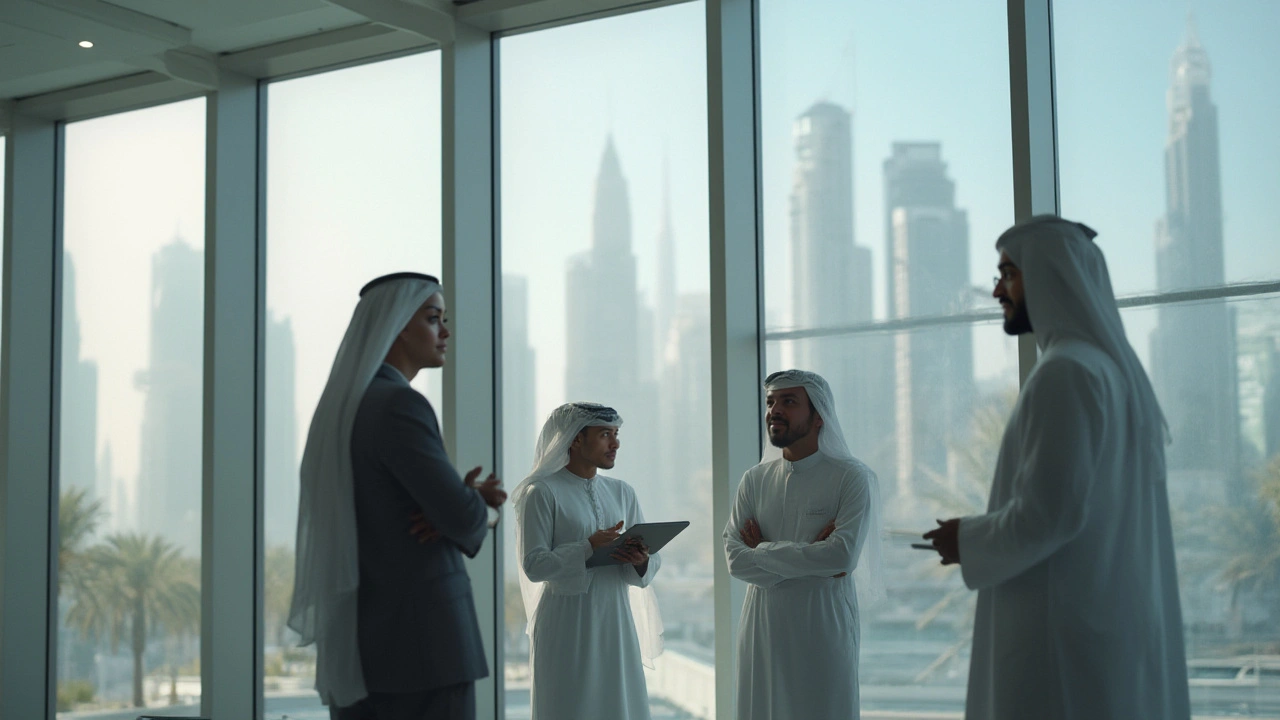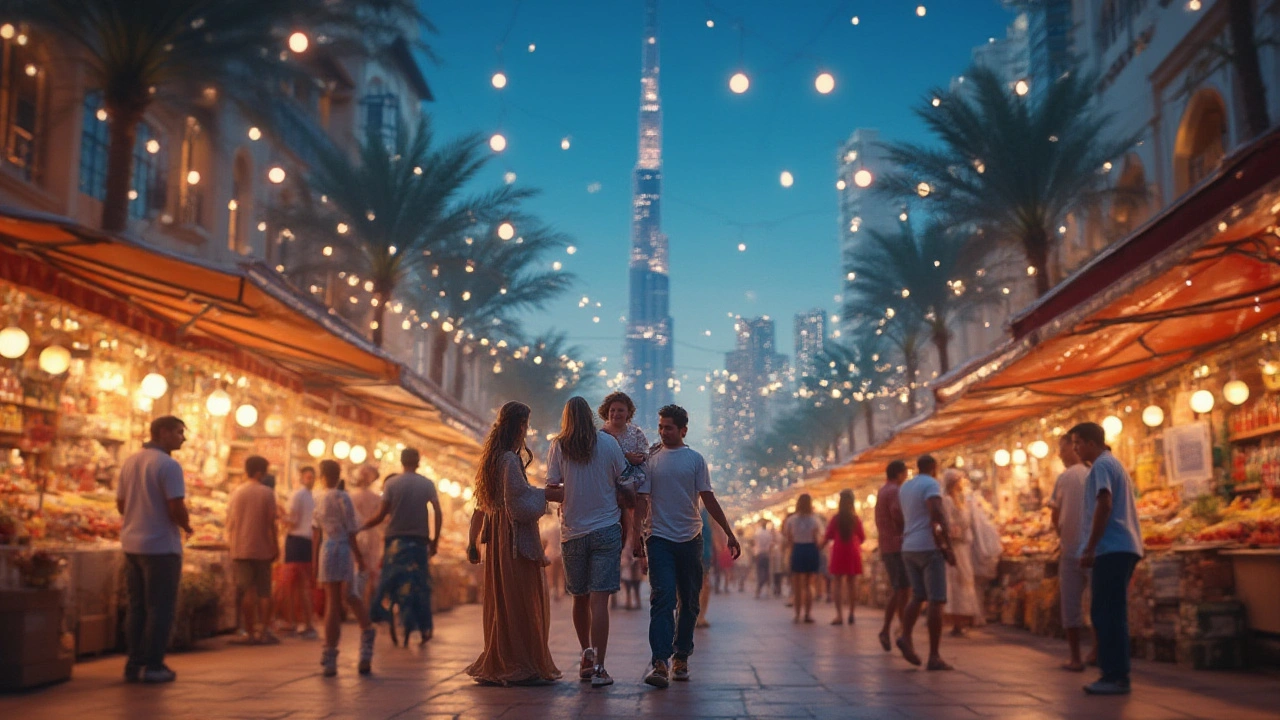The dream of uprooting your American life and jumping into the adventure-soaked cityscape of Dubai grabs people for all sorts of reasons. Maybe you picture sipping mocktails by shimmering skyscraper pools, or you've heard about young software engineers pocketing six figures without paying a dime in income tax. What’s real? What’s hype? And the big question: Can a US citizen actually move to Dubai and thrive?
Visas, Work Permits, and the Essentials for US Citizens
All right, let's clear up the myth first: no, Dubai doesn't hand out citizenship like party favors—and you can’t just show up with your US passport and settle in indefinitely. But, there’s good news. Americans are welcome visitors, and Dubai loves skilled professionals. The process of moving starts with a visa, and passports don’t carry you past that critical step. UAE tourist visas for US citizens are simple—you normally get up to 30 days on arrival, free of charge, just as you land in the shiny Dubai airport. But for anyone planning to live, work, or even retire, that’s just your layover.
The most common gateway for Americans is the work visa. This process starts with a job offer from a UAE-based employer; they sponsor your residency and handle most of the paperwork. You’ll need a passport that's good for at least six months, educational certificates (sometimes attested by the US State Department), and often a clean background check. After landing the job, you’ll have to pass a medical exam (mainly blood tests and a chest X-ray)—fail this and your Dubai dreams are over before they begin.
If you’re self-employed, Dubai has opened digital nomad and freelancer visa programs. The Dubai Remote Work Visa, for instance, lets you live there for a year while working remotely as long as you can show $5,000/month income and US health insurance. If you’re old-school wealthy or planning to invest, property investment visas for buyers of USD $205,000+ are another option, and there’s always the golden visa—10 years of renewable residency for investors, outstanding professionals, and in-demand talent (think doctors, top engineers, or digital whizzes).
But, here’s the real kicker: no permanent residency or citizenship for expats, not even after decades. If your job ends, your residency clock starts ticking. You’ll have between 30 and 180 days to get a new job or leave, depending on your social status and years in Dubai.
The good news for families: spouses and kids under 18 can piggyback on your residency sponsorship. That’s how Eamon and Callum joined me when we moved. But every family member needs their own costly medical check and Emirates ID. The Emirates ID is your golden ticket—required for opening bank accounts, utilities, signing phone contracts, or even joining the local Costco (Carrefour, in our case).
Quick visa tip: keep passport and visa scans (plus all your reference letters and identification) on your phone and in a cloud drive. Dubai loves paperwork delays about as much as it loves fast cars. When bureaucracy bites, you want your digital backup ready.
Cost of Living, Housing, and Daily Life in Dubai
If your friends say Dubai is ridiculously expensive, they aren’t exaggerating—but it’s also true that some folks live on a shoestring. Housing is your biggest wild card. In 2024, a two-bedroom apartment smack in the middle of Dubai’s expat-popular Dubai Marina hovered around $2,500 - $3,500 a month. Head to outer neighborhoods like Jumeirah Village Circle and the price drops, but be ready for longer commutes and less flash. Villas (the UAE word for houses) often cost much more, especially those with pools and backyard palm trees. Most expats rent; buying property is possible, but requires big upfront cash and stricter rules for non-GCC citizens.
But what about food? Here’s the fun bit—Dubai’s gastronomic scene is wild. Want a Big Mac? It’ll cost a touch more than in Texas (about $5.50). A fancy Friday brunch with unlimited desserts in Business Bay will set you back $80 per person. There are affordable restaurants, but imported products at supermarkets can empty your wallet fast (think $8 for a pint of Ben & Jerry’s). But veg, dairy, and fresh local meat? Quite reasonable.
Let’s talk transportation. Dubai Metro is spotless and easy, especially between main attractions (and air-conditioned, which is no joke when it’s 110°F outside). Taxis and ride-shares like Careem and Uber are plentiful. Gas prices are way cheaper than in the US, no surprise there—it’s the UAE. Still, snagging a car means you’ll have to swap your US license for a local one, which is possible and relatively straightforward for Americans if you’re a resident.
Utilities? Depending on AC use, utilities run about $200 - $400 a month for a two-bedroom apartment, especially during the brutal summer months. Water is plentiful but all desalinated—don’t drink from the tap.
Healthcare in Dubai sits high on worldwide rankings. The UAE loves its glossy hospitals and highly qualified staff—many American and European-trained. As an expat, medical insurance is required by law. Most employers provide it and often extend the coverage to spouses and kids. Out-of-pocket doctor visits range from $40 - $110, but insurance takes most of the sting out.
Here’s a quick look at average Dubai costs versus the US for reference:
| Item | Dubai (USD) | New York City (USD) |
|---|---|---|
| 2-bed rent (city center) | $3,200/mo | $5,200/mo |
| Basic utilities/month | $275 | $170 |
| Domestic help (full time) | $550/mo | $3,000/mo |
| Annual private school | $13,000 | $45,000 |
| Big Mac | $5.50 | $5.19 |
People also ask about safety. Your odds of petty crime here are lower than in most US cities—Dubai takes law and order seriously. It’s not a place where you constantly watch your bag—leave your phone on a café table, go to the restroom, and find it untouched. Still, you shouldn’t get too careless.

Culture Shock: What Americans Should Know Before Moving
Moving from the US to Dubai is a cultural gear shift, no matter how well-traveled you are. Dubai might look like Vegas meets Miami, but the roots are firmly Middle Eastern. You can buy bacon (from the “non-halal” section!) and rock shorts at the mall, but respect local customs or risk fines—or just major embarrassment.
The work week runs Monday to Friday, not Sunday to Thursday as it did before 2022, and weekends fill malls, parks, and beaches with families. Don’t expect American small talk. Dubai is a melting pot: around 88% of Dubai’s population is expat, representing over 200 nationalities. English is the street language, but you’ll hear Arabic, Hindi, Tagalog, Russian, and just about everything else. Signs are always bilingual. If you make a faux pas, most folks forgive you, since they were new once, too.
Dress code is way more relaxed than you might guess, but bikinis stay poolside—not for city streets. Public drunkenness, swearing, and rude gestures are not just frowned upon—they can get you fined or jailed. During Ramadan, don’t eat or drink in public during daylight hours, even sipping water. Plenty of restaurants will stay open, but they’ll have covered areas. The more you respect local traditions, the smoother your journey.
Bureaucracy can catch you off guard. Imagine your paperwork being sent back three times because one letter was wrong, or having to make three trips to add a marriage certificate to your residency file. Patience is your best friend here.
Bringing pets? Make sure you meet all the vaccination and microchipping requirements. Dubai is dog-friendly in many suburbs, but parks and beaches have pet restrictions. Streets are clean, and there’s almost zero stray animal problem.
Making friends is surprisingly easy, especially with expats—join a Facebook group like "Americans in Dubai" or community sports leagues. The local parenting circuit is tight, too. Schools in Dubai are private and can be pricey—ranging from about $5,000 to a jaw-dropping $30,000 per year—so it pays to research early. Most Americans opt for international curriculum schools, often IB or American standards, and spots fill up fast. Having Callum settle into a new class with over a dozen other passport holders made things easier on us than our first day at kindergarten back in Raleigh.
Religion? Islam shapes public life, but everyone is free to practice their own. Christmas trees pop up in hotels, Hanukkah menorahs sit in upscale lobbies, and you’ll find Hindu, Sikh, and even Buddhist temples in different corners of the city. But respect reigns: it’s never okay to criticize Islam or the UAE publicly, especially on social media.
Punishments for law-breaking can seem harsh by US standards. Jail for a bounced check isn’t just a joke—it’s reality. Homosexuality is officially illegal, but the reality is more quietly tolerant in expat circles, with rainbow nights common in certain clubs. Still, don’t risk it in public.
Making Dubai Feel Like Home as a US Expat
If you’re wired for adventure, Dubai gets under your skin quickly. Yes, the summer months feel like living in a hair dryer, but city life pushes you into air-conditioned cafés, giant indoor amusement parks, and the wild West style desert drives every tourist guide mentions (but which actually never get boring).
Networking matters in Dubai. Social connections open up jobs and opportunities. LinkedIn is huge, but so are local “breakfast catch-ups” at places like The Sum of Us or Jones the Grocer. Dubai runs on WhatsApp groups for everything—join some early.
There’s no income tax in the UAE on salary, but the US will still want its share of your earnings, so factor in dual tax-filing. Get a pro familiar with expat tax issues—you don't want IRS drama biting you in paradise. Property taxes are lower, but you do pay the 5% VAT (Value-Added Tax) on most purchases, and annual housing "municipality fees."
Stay-cations are a thing. Dubai’s central airport and affordable flights make weekend getaways to Zanzibar, Jordan, Sri Lanka, or Turkey feel totally doable. Living here means your world opens up—your kids might not blink at crossing borders for school field trips.
If you’re aiming long term, you might hit homesickness. Happens to everyone. Hunt out American groceries (wait until Thanksgiving and see the Whole Foods stock-outs!). The expat community always throws July 4th barbecues, school graduations, and Halloween bashes—the need for home traditions doesn't fade, it just adapts. Even local restaurants like Claw BBQ or Black Tap host American holiday events, so you never run out of an excuse to find fellow Yankees when you're feeling a little out of place.
But the single best perk? Perspective. Raising Callum in an international crowd shifted how he views the world, and I can’t imagine him getting the same kind of global exposure anywhere else. Dubai’s safe, clean, service-oriented, fast-moving, and a little surreal. As an American in Dubai, you’re part traveler, part guest, and always a bit of an outsider—but that’s what makes it addictive. If you can wrap your brain around the red tape, the rules, the heat, and hug the wild mix, Dubai might give you years you’ll never want to trade back.
